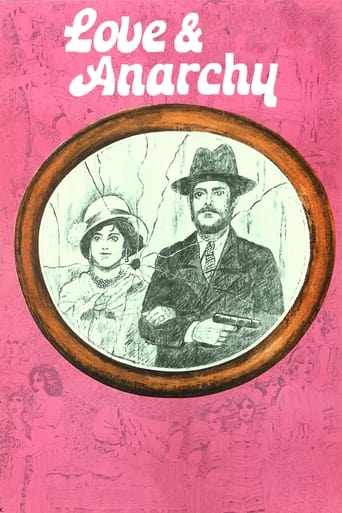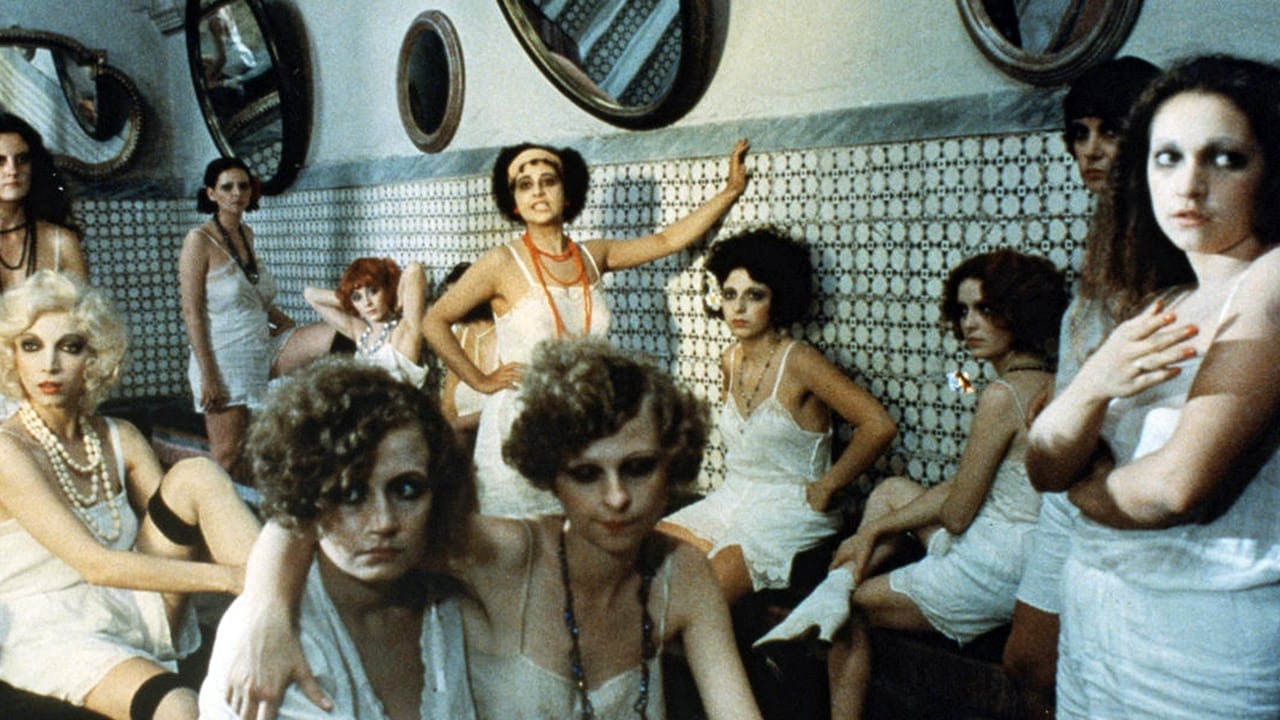lasttimeisaw
To live like a dog or to die like a dog? It is an elemental question hovering above the head of a disaffected but weak-minded farmer Tunin (Giannini), after his anarchist friend being murdered by fascist police, he decisively joins the anarchist camp, and takes up his dead friend's cause, to kill Benito Mussolini. He arrives in Rome, and contacts his comrade Salomè (Melato), a premier prostitute in a brothel, who will assist to carry out his assassin plan. During a location scout with the unsuspecting Spatoletti (Pagni), the head of Mussolini's police division, Tunin falls for a young working girl Tripolina (Polito), will the mutually spontaneous romance spoil Tunin's determination of his action? Or, does it matter?LOVE AND ANARCHY is Wertmüller's seventh feature, which debuted in Cannes in competition and won Giannini BEST ACTOR award. It is the second teamwork for Wertmüller, Giannini and Mariangela Melato, after THE SEDUCTION OF MIMI (1972), and they would try a third time in SWEPT AWAY (1974) one year later.Freckle-faced, disheveled, Tunin is an honest but slow-witted countryside man, hasn't been to seaside before, he is not even a radical anarchist, but avenging the death of his friend, is the only thing he knows that can prove his worth, whether or not it is a suicidal mission. Fear is something he has to battle everyday, Giannini registers a viscerally soul-pulverising performance as Tunin, downplays his masculine charm and portrays him as a sympathetic, the salt of the earth sort, a cog in the machine, but radiates with those attributes what make human human. Mariangela Melato's Salomé, a spitfire driven by her own scores against the repressing government, is also superbly thrilling to behold, her piercing look, gravelly voice, worldly-wise flamboyance, and her unabashed camaraderie and affection towards Tunin, leaves a searing impact afterwards. A then 19-year-old Polito, a debutante in her full-fledged flapper outfit, thrusts herself into a more rational attempt to save her lover, only to no avail.Wertmüller's resplendent depiction of the Italian brothel is certainly inspired by aesthetics of Fellini school, and her taste for music is admirably impeccable as well, whether it is classical pieces like Debussy's CLAIRE DE LUNE, or the catchy French ditty LA PETITE TONKINOISE by Vincent Scotto, together with Nino Rota's sentimentally melodious score, emotionality and vivacity are eternally among the national spirits running in the Mediterranean blood of Italian people, not even the ominous subject matter and demoralising situation can change its tonality.Less heralded than Wermüller and Giannini's most acclaimed collaboration SEVEN BEAUTIES (1975), which earned both Oscar nominations (yes, Wermüller is the first woman who has even been nominated for BEST DIRECTOR), LOVE AND ANARCHY is no less a fine-crafted equivalent which speaks loud about its filmmakers' political slant and an outstanding melodrama can transfix its audience without compromising its thematic tragic.
fred-houpt
It's such a shame that Wertmuller no longer commands the interest of producers. She gave us such powerful films, and at her peak, she and Giannini could do no wrong. European directors have given us films that excoriate Fascists. There is Bertoluci's "1900" and "The Conformist"; Costa Gravas's "Missing", there is "Schindler's List","The Pianist", "Two Women" are just a few of a long list. What does Wertmuller show us? Simple people get caught up in every single war, WW 2 was no exception. There were probably all kinds of attempts to kill Mussolini before he was finally caught and hung up like a piece of meat. This movie takes place early in the rise of El Duce. To openly show displeasure with his black shirted thugs would guarantee a short and brutal outcome. The same held true for those brave and furious souls in Spain and Germany who tried (in vain) to stand up against Fascism. The main story in this drama is the almost mad plans of a simple country bumpkin who seeks to avenge the murder of an "anarchist" who planned to kill Mussolini but got carried away and told everyone in the town of his plans. Next thing we see is him murdered. Giannini's character shows up in Rome and seeks refuge in a brothel (all pre-arranged), after having gone to France for training in shooting a gun. Much has been made of the mayhem inside the brothel but to me this is color adding to the texture, it is subtext. The main body of this drama evolves with Tunin and his trembling approach to the plot. That he becomes embroiled in an unexpected love for a prostitute is but one twist in the plot. There are several wonderful scenes where he has ample opportunity to kill a vile fascist thug who is a regular at the brothel but he refuses to get sidetracked. Even after having fallen in love he still refuses to divert from his presumed destiny. He fully expects to either fail or even if successful to get caught and killed for his efforts. "Tunin" tries to make sense of his confused feelings and at the end has to abandon clarity for duty. He is confused, frightened and compelled to honor his fallen comrade. The surprise twist (I won't spoil it) at the end of the film pushes him over the edge into an irrational, spontaneous and self destructive spree. His fate once met is anti=climactic, he having already intuited the end. The film is funny, tense and upsetting. I simply cannot believe how fast Mariangela Melato speaks, she sounds like the fast rattle of a machine gun. The cast is totally wonderful, the direction tight, with evocative single frame shots of Tunin in a pose, creating a "snapshot" feel, supporting his introspection as he plans. (An aside: what is up with Giannini's face? He looks like his face was covered in splotches ...like freckles; he looked sickly and scary and did not look like this in "Swept Away") Anyway, a really powerful drama, the likes of which we just don't see today.
aimless-46
Rather than contend for film with the longest title, "Film of Love and Anarchy (or At Ten o'clock This Morning in Via dei Fiori in the Infamous House of Prostitution)" is better known by the more manageable "Love and Anarchy". This 1973 Lina Wertmüller thriller is a hard first watch because there is no suspense to grab the viewer and hook them into the story. I was only able to handle about 30 minutes at a time, not because it was unpleasant but because I was too uninvolved in the story to ignore distractions and interruptions. But while it withholds most of its appeal from the initial viewing, it yields something new each time it is viewed."Love and Anarchy" is more an expressionistic opera than a realistic thriller. Imagine "Cabaret" starring Charlie Chaplin's "Little Tramp" and you will have a good idea of its style. It's main theme sneaks up and surprises you. U.S. viewers, dimly aware of the great depression and World War Two, suffer a complete cultural disconnect regarding the continuing legacy of fascism in Italy and Germany. Meaning that anti-fascist political messages are embedded in almost all post-war Italian cinema. But Wertmüller's "Love and Anarchy" has the broader theme of anti-extremism, taking shots at those who make major sacrifices out of perverted idealism and a lack historical perspective. The film begins with its main character Tonino (Giancarlo Giannini) at a turning point in his life, the execution of an older relative for political subversion. After viewing the body on display in what would otherwise by an idyllic rural setting, Torino is inspired to take over what he perceives as his relative's mission, the assassination of Benito Mussolini. Tonino goes to Rome and links up with his anarchist contact, a highly sought after call girl named Salomè (another Wertmuller regular Mariangela Melato), her brothel is popular with the Fascists and Mussolini's head of security, an arrogant blow-hard named Spatoletti (Eros Pagni), is especially fond of Salomè. Tonino and young call girl Tripolina (Lina Polito) soon fall in love which serves to greatly complicate his mission.I watched the widescreen version of the film on the Fox Lorber DVD, and contrary to several other comments I found no problems with the film transfer. My guess is that these refer to the variation in color tone as the film cuts between characters, but this is a deliberate effect by Wertmüller's. She lights each face differently to convey the character's motivation. The uncomplicated Torino is given natural lighting, the political Salomè is tinted red, and the disillusioned Tripolina is in shadow. These combine with bold colors, a surreal score, and acute camera angles that exaggerate elements and play with scale in many of the frames. The everyday scenes in the brothel are especially good, combining the audacious with the darkly comic. The best is a carnival-like montage to music showcasing the start of a busy day of business for the prostitutes and their eager customers. In almost any other film Pagni would steal the whole thing with his overplayed performance but Melato matches him line for line. This contrasts nicely with the more subtle and nuanced performances of Giannini and Polito. Polito is very effective when Wertmüller makes use of her eyes in several close-ups.There is much overwrought melodrama as Wertmüller uses a farcical tone to illustrate that the Fascists and their opposition are linked by a common hypocrisy and a shared perversion of idealism. Ironically the film is at its best during its quiet scenes such as Tornio and Tripolina's stroll through the plazas of the city. This is an important film with an original message, fine performances from the entire ensemble, and really slick film-making techniques.Then again, what do I know? I'm only a child.
raskimono
The well-regarded director Wertmuller made this movie which is a slow study into how brutality and violence can be saved my love in my opinion. It is very operatic which is how she chose to attack it. The direction, I can say is flawless but the movie feels incomplete. First, I am more the director who uses visual images rather than hammy stagey dialogue to tell their stories. Carnini is the only actor who does not use a pantomime, overexagerrated style in the movie until the very end, while everybody else does. It softens the impact of the movie as it is the quieter moments that carry real weight. The style of direction is very narchiac with wonderful wide shots and good editing creating an effigy of exuberance over the picture. Most of the picture set in an italian bordello where the fascists of italy stay is a place for both love between carnini and pesilamo. Images are beautiful, and certain individual scenes work while others don't. We are left with a great understanding of what love must feel like but the brutality of man is never explained. It esssentially sets up the theory that all fascists are naturally evil. The ending tells us it is the stoty of one man while the movie sets it up as the story of every man. This the best explanation I can give without speaking too much about its plot. Wertmuller was much better in Swept away and seven beauties. But for an introduction to Wertmuller, and arty Italian cinema of the sixties and seventies which dealt very operaticly with evils of fascism.




 AD
AD



